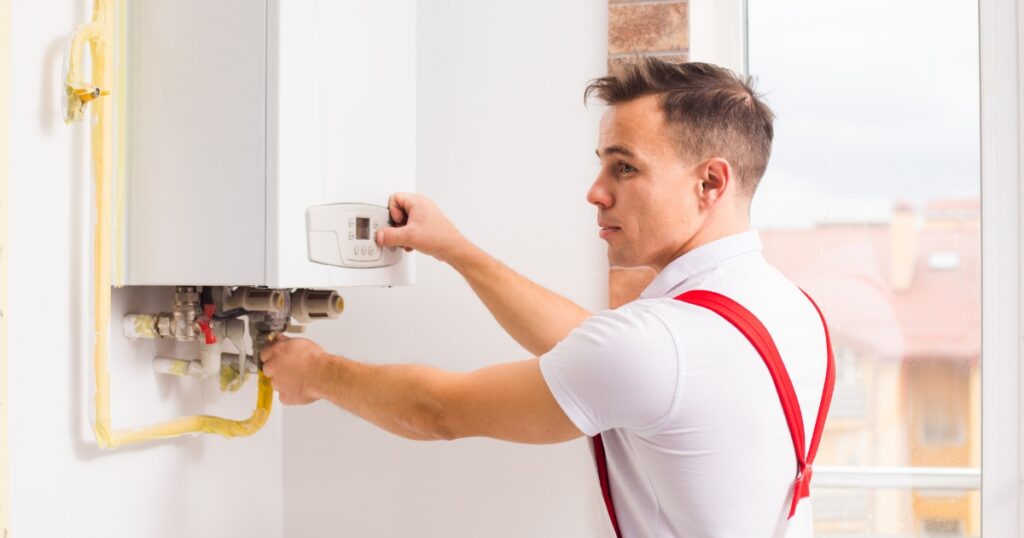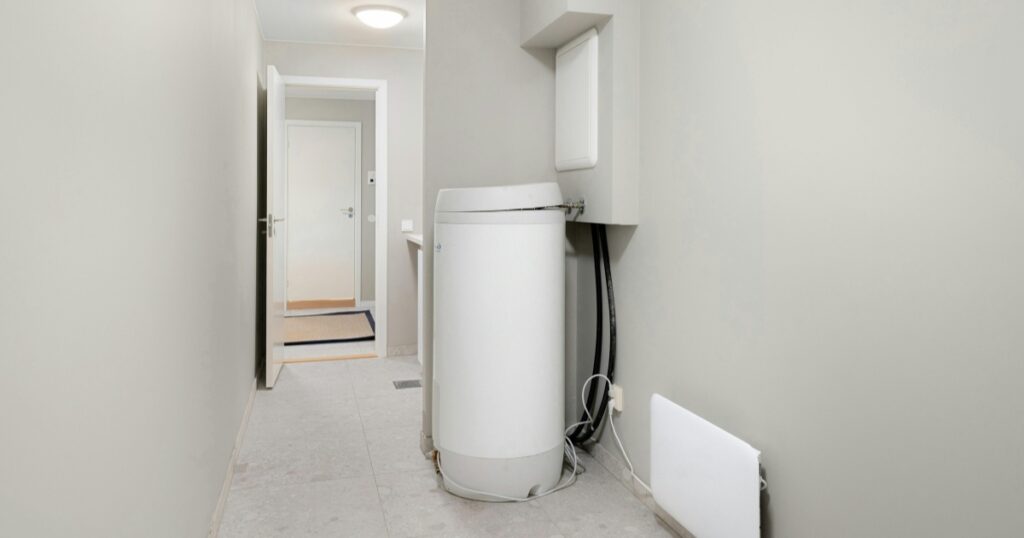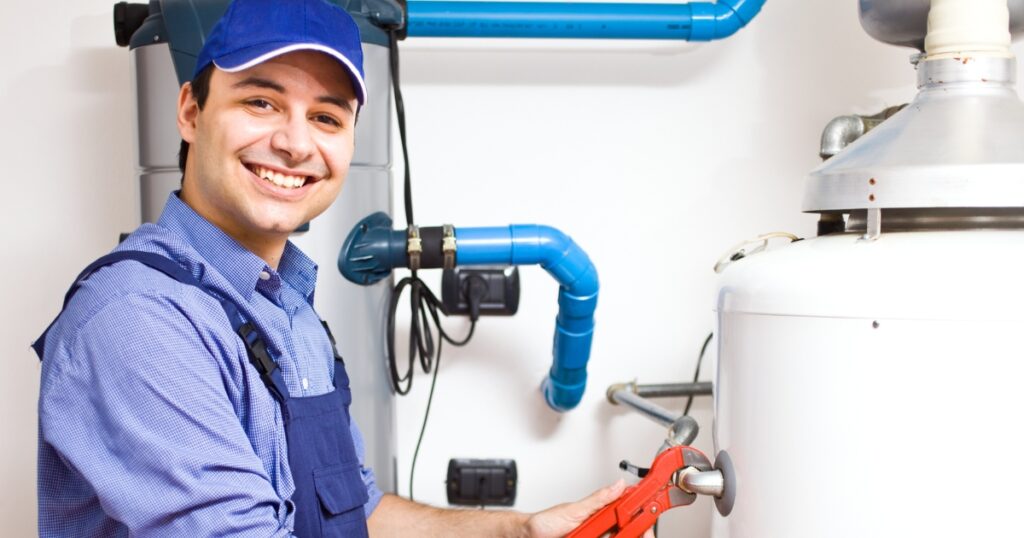Choosing the right hot water heater can turn into a bit of a saga, what with all the jargon and specs thrown at you. It’s enough to make your head spin – we’ve seen it happen! But never fear because our nifty guide is here to help you sort through the maze of options and efficiency ratings without breaking a sweat.
Did you know that heat pump water heaters are champs at saving energy? They use just a third of what those old-school electric systems chew through. So, grab yourself a cuppa; we’re about to make sense of everything from unit types to sweet government rebates that’ll have you picking out your new hot water system like a pro.
You’re on track for some seriously clever shopping – let’s get into it!
Key Takeaways
- Electric storage water heaters are suitable for homes with high hot water demands, and choosing energy-efficient models can lead to long-term cost savings despite initial higher costs.
- Gas instantaneous hot water systems provide a constant supply of hot water without the need for storage, and opting for high energy efficiency rated models can contribute to significant energy cost reductions over time.
- Solar water heaters harness sunlight to heat water, offering an eco-friendly and cost-effective alternative. Government rebates further enhance the financial accessibility of solar hot water systems.
Types of Water Heaters
There are several types of water heaters to consider, such as electric storage, gas storage, gas instantaneous, electric heat pump, and solar. Each type has its own unique features and benefits.
Electric storage
Electric storage water heaters come with insulated tanks where large volumes of hot water are stored and ready for use.

We plug them into the electrical system, and they heat the water to a set temperature, keeping it warm until we need it.
Switching to an energy-efficient electric storage heater can lower our electricity bills. Let’s make sure we choose models with excellent Energy Star ratings; better-rated systems can save us more in the long run, despite costing a bit more upfront.
We always keep an eye out for high-performance options that meet minimum energy performance standards (MEPS), which guarantee us some level of savings on operational costs.
Gas storage
After understanding the features of electric storage water heaters, it’s essential to consider gas storage systems. High-efficiency gas hot water systems are considered economical when operating on natural gas.
Look for systems with a minimum energy performance standard (MEPS) rating of at least 5 stars to ensure energy efficiency and cost savings in the long run.
It is crucial to consider factors such as running costs for gas vs electric hot water systems and the efficiency of instantaneous electric systems. Gas storage units offer an efficient way to store heated water for later use, providing a reliable source of hot water while also minimising energy consumption.
Gas instantaneous
Gas instantaneous hot water systems heat water on demand, providing a constant supply of hot water without the need for storage. These systems are highly efficient and can help reduce energy costs.
When considering gas instantaneous hot water heaters, look for models with high energy efficiency ratings, such as 5-star ratings, to ensure cost savings and reduced environmental impact.
Additionally, comparing gas vs electric running costs is essential in making an informed decision about which system best suits your home’s needs and budget.
Electric heat-pump
Electric heat-pump water heaters are highly efficient, using only 30% of the energy of a conventional electric hot water system. When considering an electric heat pump, it’s important to factor in the long-term energy efficiency and cost savings for your home.
These systems work by drawing in warmth from the air to heat the water, making them a sustainable and environmentally friendly option for heating your household’s hot water supply.
When choosing an electric heat pump system, look for models with high energy ratings to ensure optimal performance. It’s also essential to consider factors such as available space for installation and compatibility with your home’s electrical setup.
By opting for an electric heat pump water heater, you can reduce your environmental impact while enjoying significant savings on your energy bills.
Solar
Solar water heaters are energy-efficient and environmentally friendly, harnessing sunlight to heat your water. By utilising solar panels or collectors, these systems minimise your reliance on traditional heating methods.
They are a cost-effective option in the long run, offering substantial savings on energy bills and reducing your carbon footprint. Solar hot water rebates also provide additional incentives for homeowners considering this sustainable alternative.
When choosing a hot water system, it’s essential to weigh the benefits of solar options against other fuel types such as gas and electric. Solar systems have the advantage of being highly efficient and can significantly lower your household’s energy consumption.
Choosing the Right Water Heater
Consider fuel types such as electric, gas, or solar when deciding on the most suitable water heater for your home. Check energy efficiency ratings and determine the appropriate size to ensure you’re choosing a system that meets your household’s hot water needs while also being cost-effective.
Consider fuel types
Gas, electric, and solar are the primary fuel types for hot water systems. Gas heaters are often the most economical when operated on natural gas, with a minimum energy performance standard to ensure energy efficiency.
High-efficiency gas systems with a 5-star rating provide optimal performance. Electric heat pump systems use only 30% of the energy compared to conventional electric ones, making them highly efficient.
Solar hot water systems also offer an eco-friendly solution by harnessing renewable energy from the sun.
When choosing a fuel type for your hot water system, consider factors such as ongoing running costs and long-term energy efficiency to make an informed decision.
Check energy efficiency ratings
When selecting a hot water system, it’s vital to check the energy efficiency ratings. Look for systems with a minimum of 5 stars, ensuring they meet high energy efficiency standards.
Hot water heaters with Energy Star ratings can help homeowners balance purchase prices and long-term energy savings.
Consider the different types of hot water systems available and choose one that aligns with your specific needs while offering optimal energy efficiency. Ensure you factor in factors such as gas vs electric running costs and the efficiency of instantaneous electric hot water systems to make an informed decision for cost-effective and sustainable home heating solutions.
Determine appropriate size
After checking energy efficiency ratings, determining the appropriate size for your hot water system is crucial to ensure it meets your household’s needs. Consider factors such as the number of bathrooms and people in your home to calculate the required capacity.
It’s important to get this right as an oversized unit can lead to unnecessary energy consumption, while an undersized one may not meet your daily demand for hot water.
Assessing the peak usage times in your household will also help in selecting a system with a sufficient recovery rate, ensuring everyone has access to hot water when they need it. Additionally, understanding the different types of water heaters available and their respective sizes will aid in making an informed decision that aligns with both energy efficiency and practicality.

Government Incentives
There are government incentives such as rebates for switching to energy-efficient hot water systems and solar hot water rebates available for homeowners.
Rebates for switching to energy-efficient systems
Government rebates are available for homeowners who switch to energy-efficient hot water systems.
By taking advantage of these rebates, you can not only lower your initial investment in a new system but also benefit from long-term cost savings through reduced energy consumption.
It’s important to explore and take advantage of these programs as they can significantly offset the overall cost of upgrading to an energy-efficient hot water system, making it a more economically viable choice.
Solar hot water rebates
When considering energy-efficient systems, it’s also essential to explore solar hot water rebates. These rebates can significantly reduce the upfront cost of installing a solar hot water system.
By taking advantage of these incentives, homeowners can not only lower their initial investment but also benefit from reduced energy bills in the long term. It’s important to research and understand the available rebates in your area, as they can vary based on location and government initiatives.
Solar hot water systems are known for their high energy efficiency and environmental benefits. The availability of rebates further enhances their appeal by making them more financially accessible to homeowners looking to transition towards sustainable and cost-effective hot water solutions.
Replacing Your Existing Hot Water Heater
When replacing your existing hot water heater, ask retailers and plumbers about the most energy-efficient options available. Also, make sure to properly size a new hot water system based on your household’s needs.
Questions to ask retailers and plumbers
Ask retailers about the energy efficiency ratings of different hot water systems. Inquire about available government incentives and rebates for switching to more efficient models, as well as any solar hot water rebate schemes.
Seek advice on selecting the right size of hot water system based on your household’s needs and the various types of systems available.
When speaking to plumbers, ask about their experience with installing different types of hot water heaters. Discuss maintenance requirements and energy-efficient options that would be suitable for your home.
How to size a new hot water system
When considering how to size a new hot water system, it’s important to assess your household’s needs and consider the different types of systems available. To determine the appropriate size, take into account factors such as the number of people in your home, peak usage times, and simultaneous hot water demands.
Additionally, look for energy-efficient models that align with your daily hot water requirements. It’s crucial to strike a balance between capacity and efficiency to ensure you have enough hot water without unnecessary energy consumption.
Furthermore, consulting with a professional plumber can provide valuable insight into selecting the right-sized water heater for your specific needs. They can conduct an assessment based on your household’s habits and guide you towards choosing an appropriately sized system that optimises energy savings while meeting demand.
Choose the Right System
In conclusion, choosing the right hot water heater involves considering fuel types and energy efficiency ratings. It’s important to assess your needs and understand the different system types available.
Government incentives, such as rebates for energy-efficient systems, can also help offset costs. Don’t forget to ask retailers and plumbers relevant questions when replacing your existing hot water heater.
Lastly, always weigh the long-term energy efficiency and cost savings before making a decision on your new hot water system.






